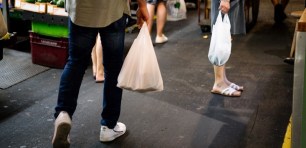
Source: Unsplash/Nathan Dumlao
Western Australia will become the first Australian state to ban takeaway coffee cups in a sign of things to come for east coast cafes, but the peak retail body has warned that small businesses will suffer through the sustainability transition if they don’t get enough time and government support.
Plastic-lined coffee cups and lids — as well as the small plastic produce bags in supermarkets, most cotton buds and polystyrene cups — will be prohibited from next year under the McGowan government’s second stage single-use plastic ban.
Coffee shops in the west will have between six and 18 months to either replace the plastic-lined cups with paperboard-lined ones (and plastic lids with bagasse or cardboard) or else risk a fine of $5000 per transgression.
But it won’t be cheap. A consultation paper from the WA Department of Water and Environmental Regulation estimated the cost of low-plastic coffee cups was 30% higher than the plastic ones.
‘Cost-effective is key’
Paul Zahra, chief executive of the Australian Retail Association (ARA), has warned that small businesses are particularly vulnerable to the plastic phase-out and says he hopes the government will focus on finding a “cost-effective” way to do so.
“The most critical thing is that businesses are given adequate notice and are properly consulted so they can take the necessary steps to source more sustainable products to replace the single-use plastics that are being phased out,” he said.
“This is particularly important for the state’s small businesses, who may have limited resources in the sustainability space and require additional support to continue with their transition away from single-use plastics.”
But Zahra says the Australian retail industry is committed to being a part of the greener solution, noting single-use plastic’s “devastating impact on our natural environment, and particularly the health of marine life”.
Western Australia throws away some 182 million takeaway coffee cups a year; indeed countrywide, the cups are the second-most littered item behind plastic bottles.
“We commend the WA government for their leadership and determination to phase out single-use plastic items,” Zahra said.
NSW cafes banning cups
It seems a matter of if, not when, all other states and territories will follow suit and ban the takeaway coffee cup too.
NSW’s lightweight plastic bag ban came into effect on June 1 this year, while November 1 will see single-use plastic straws, cutlery, chopsticks, and food picks all axed too, enforceable with fines between $11,000 and $250,000.
But coffee cups aren’t on the list yet. A spokesperson from the NSW Environment Protection Authority (EPA) said the NSW Plastics Action Plan commits the state to a review of plastic cups including lids and available alternatives in 2024.
“In NSW, single-use plastic items and packaging make up 60% of all litter,” the spokesperson told SmartCompany.
But some NSW cafes aren’t waiting for the coffee cup ban to be legislated. Bondi Beach’s bRU Coffee banned all single-use coffee cups from July 1 as part of a pilot program from Our Kinds.
It’s a subscription mug service that gives out recycled mugs to cafes. Customers are asked to return the mug next time they visit, but they can also ask the barista to scan a barcode to learn how many takeaway cups have been saved from their mug.
Queensland’s coffee cup ban won’t come into force until 2024, and September that year will also mark an expiry date for most cotton buds, plastic microbeads in beauty and cleaning products, as well as mass release of helium balloons.
Plastic ban creates jobs
Over in South Australia, the former Liberal government suggested coffee cups would be the next to go in the single-use plastic ban movement in a 2021 discussion paper called Turning the Tide, although Labor’s Peter Malinauskas has since taken the reigns.
At the time, a statement from the state’s former Minister for Environment and Water David Speirs stressed that single-use products would not be outlawed until businesses could easily pivot to suitable alternatives.
“The discussion paper outlines plastics items the public could consider, such as coffee cups, plastic bowls and plates, but we want to hear from the community,” the statement read.
“Importantly we won’t be banning any items unless there are readily available alternatives.
“Our plastic ban isn’t just good for the environment – by being a first mover nationally we’ve already seen businesses who manufacture reusable and compostable alternatives start to set up in South Australia, which means we are seeing significant economic benefits and the creation of local jobs.”
Handpicked for you

State-by-state plastic ban timelines a ‘headache SMEs could do without’, peak retail body says



COMMENTS
SmartCompany is committed to hosting lively discussions. Help us keep the conversation useful, interesting and welcoming. We aim to publish comments quickly in the interest of promoting robust conversation, but we’re a small team and we deploy filters to protect against legal risk. Occasionally your comment may be held up while it is being reviewed, but we’re working as fast as we can to keep the conversation rolling.
The SmartCompany comment section is members-only content. Please subscribe to leave a comment.
The SmartCompany comment section is members-only content. Please login to leave a comment.